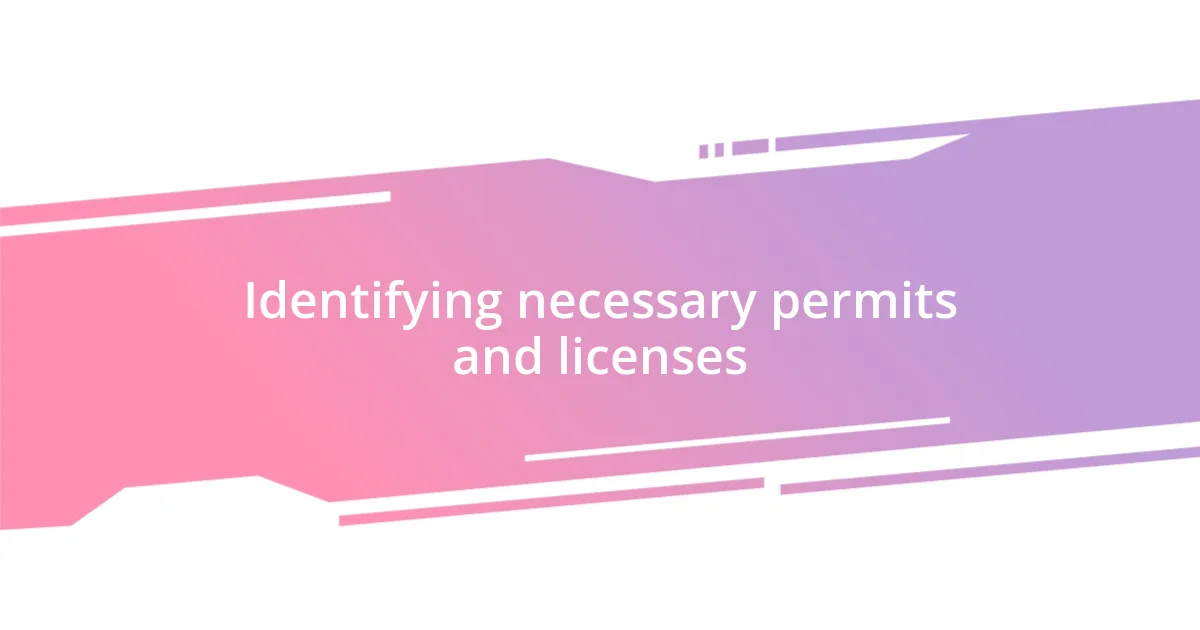Key takeaways:
- Building relationships with local government officials can simplify understanding and navigating small business regulations.
- Identifying and tackling necessary permits and licenses one by one makes the daunting process more manageable and less overwhelming.
- Utilizing resources like local business associations and online platforms enhances ongoing support and understanding of regulatory compliance.

Understanding small business regulations
Navigating small business regulations can feel overwhelming at times. I remember sitting at my kitchen table, surrounded by stacks of paperwork, wondering where to even begin. Each form seemed to carry the weight of my dreams, and I often asked myself, “How did it become this complicated?”
One significant thing I learned is that regulations can vary significantly depending on your location and industry. There were countless nights I spent researching local zoning laws and licensing requirements, often feeling like I was piecing together a puzzle with missing pieces. It made me appreciate the importance of understanding the specific rules that apply to my business, as ignorance is rarely an excuse that holds up.
In my experience, building relationships with local government officials can be invaluable. I recall a time when a friendly chat with a local inspector not only clarified several regulations but also opened doors for my business. It’s moments like these that highlight the need for clear communication and collaboration, making the regulatory landscape feel a little less daunting. Have you ever thought about how those relationships could ease your own regulatory journey?

Identifying necessary permits and licenses
Understanding the necessary permits and licenses for your small business can be a daunting task. When I first embarked on my journey, I was amazed at how intricate the process can be. I recall spending hours combing through online databases, only to discover that my situation required a unique set of permits. It felt like trying to decipher a secret code, with every obscure form representing potential roadblocks to my dreams.
To help clarify this process, here’s a quick list of common permits and licenses that small business owners often need to consider:
- Business License: A general requirement to operate legally within your city or state.
- Zoning Permits: Ensuring your business location aligns with local zoning laws.
- Health Permits: Necessary for businesses in the food, healthcare, or beauty industries.
- Sign Permits: Regulations surrounding advertising signage in public spaces.
- Seller’s Permit: Required for businesses selling tangible goods that collect sales tax.
Each one of these has its own set of criteria and application processes, which can be quite overwhelming. I remember the relief I felt when I finally tackled these permits one by one, celebrating small victories along the way! Breaking them down made it much more manageable, and I encourage you to take the same approach when you’re faced with an array of regulations.

Navigating local zoning laws
Understanding local zoning laws is an essential aspect of running a small business that I wish I had grasped sooner. Initially, I found myself puzzled by the different classifications of zones—residential, commercial, and industrial—and how they directly impacted where I could set up shop. I remember driving around my town, taking mental notes of locations I admired, only to later realize that some of those spots were in zones where my business simply couldn’t operate.
It’s fascinating how zoning laws can shape not only my business but also the neighborhood around me. For instance, I once considered a charming spot in a historical district, thinking it would attract customers. However, after a thorough check of the zoning regulations, I discovered that only specific business types were allowed there. It drove home the point that awareness of these laws is crucial because the wrong choice could lead to significant consequences, like fines or forced relocation. Have you experienced something similar where venue choice turned out to be more complicated than you thought?
When navigating these zoning laws, I found various tools helpful, like speaking to local planning departments, using online databases, or even joining local business owner associations. Engaging with the community not only provided clarity concerning the regulations but also offered camaraderie, knowing that others faced similar challenges. Together, we helped each other navigate town meetings and zoning hearings, sharing insights and strategies for overcoming obstacles. Here’s a simple comparative overview of zoning types:
| Zoning Type | Description |
|---|---|
| Residential | Areas primarily for housing; certain businesses may be permitted. |
| Commercial | Areas designated for business activities; offers the most flexibility for small businesses. |
| Industrial | Locations for manufacturing and heavy industry; often have strict regulations. |

Complying with tax obligations
Complying with tax obligations can feel like navigating a maze, but it’s essential for the survival of your small business. I remember the first time I had to sort out my tax responsibilities; it was overwhelming. Tax codes and rules seemed to change all the time, and I often questioned whether I was doing everything correctly. Have you felt that way too? It’s common for small business owners to find themselves wondering if they’ve missed something crucial.
The complexity increases with different tax types, such as income tax, sales tax, and employment taxes. I vividly recall the anxiety I felt when I realized I needed to register for a sales tax permit before making my first sale. I fought the urge to procrastinate, fearing penalties if I got it wrong. So, I dedicated a chunk of my weekend to research and reached out to a local accountant for guidance. That one conversation provided a clear path and helped me see tax compliance as an opportunity rather than a burden.
There’s also the importance of tracking your income and expenses meticulously. In my early days, I relied on spreadsheets, but that quickly became overwhelming. After a few frustrating months, I decided to invest in accounting software. This shift transformed my approach, making tax season less of a nightmare. Have you found tools that make your financial life easier? I believe that establishing a solid record-keeping system not only simplifies tax obligations but can also add a layer of peace of mind as you grow your business.

Managing employee regulations
Managing employee regulations is a multifaceted aspect of running a small business that demands attention and care. I distinctly remember my initial struggles with understanding the various labor laws—from wage requirements to employee rights. One particularly stressful moment was when I received a concerned call from an employee regarding overtime pay. It hit me how much responsibility I had; ensuring compliance was not just about avoiding penalties but also about fostering a workplace that valued fairness and transparency.
Laying down clear employee guidelines can make a significant difference in maintaining a positive work environment. In my experience, crafting an employee handbook was a game-changer. Initially, I thought it would be a tedious task, but as I penned down the policies regarding attendance, harassment, and performance, I realized it provided both clarity for my staff and a layer of protection for myself. It became a reference point that I could also draw upon during staff meetings, reinforcing not just my commitment to the law, but also to creating a respectful workplace. Have you ever had to explain a policy that you thought was straightforward, but it turned into a lengthy discussion?
Training sessions are another vital piece of the puzzle. I recall a time when I organized mandatory training on workplace safety and discrimination. At first, I was worried about the employees’ reactions; wouldn’t they perceive it as just another HR formality? But to my surprise, the engagement was fantastic! Employees appreciated the effort—it turned into an open forum where we addressed real concerns and built team cohesion. This experience taught me that investing time in employee education can nurture a culture of compliance and trust, ultimately leading to a harmonious workplace. How have your training initiatives shaped your business?

Implementing health and safety standards
Implementing health and safety standards is a crucial step for any small business, and I learned firsthand the impact it can have on both employee well-being and productivity. I vividly remember conducting my first health and safety assessment; it was eye-opening. I was shocked at how many potential hazards existed in our workspace that I had overlooked. Have you ever been surprised by something you thought was perfectly safe? Addressing these issues early on not only eased my worries but also showed my team that their safety mattered.
Creating a safety policy gave me the opportunity to engage my employees in ways I hadn’t anticipated. When I drafted our health and safety policy, I came up with the idea of involving my staff in brainstorming sessions. It was remarkable to see their enthusiasm as they identified risks and suggested improvements. I learned that empowering employees to take part in safety initiatives fostered a culture of accountability. What about you? Have you seen team members step up when given the chance to contribute to their own safety?
Training and education about health and safety standards became a fundamental part of our routine. I recall the first workshop I hosted—it felt like a chore at the time. Yet, as I shared valuable tips and practices, the atmosphere shifted. Employees began discussing their own experiences and concerns—I was amazed at how much it unified us. Now, I genuinely believe that ongoing safety training isn’t just a checkbox to mark but a vital investment in our team’s morale and trust. How do you keep your team informed about safety regulations?

Resources for ongoing regulatory support
Finding reliable resources for ongoing regulatory support can be a game changer for a small business owner. When I first navigated the ever-changing landscape of regulations, I discovered a few key organizations that provided invaluable assistance. For example, joining local business associations offered me access to workshops and networking opportunities with other entrepreneurs who shared their experiences and resources. Have you tapped into your local network? It might just be the support you didn’t know you were missing.
Online platforms have also proven to be quite helpful. When I stumbled upon websites dedicated to small business regulations, I was struck by how extensive and user-friendly they were. They often feature updated resources, articles, and templates that make understanding complex regulations a bit less daunting. I even found a valuable compliance checklist that I still reference regularly. Have you explored the wealth of information available online?
Moreover, leveraging tools like compliance management software can streamline your processes significantly. I remember implementing a system that tracked my obligations and deadlines, relieving a substantial amount of stress. It allowed me to focus more on running my business, knowing I was on top of my regulatory responsibilities. What strategies have you employed to manage compliance in your organization?














